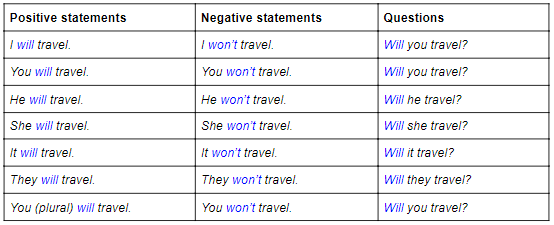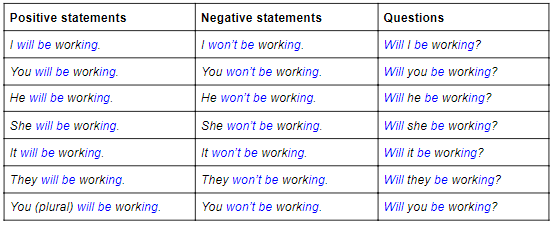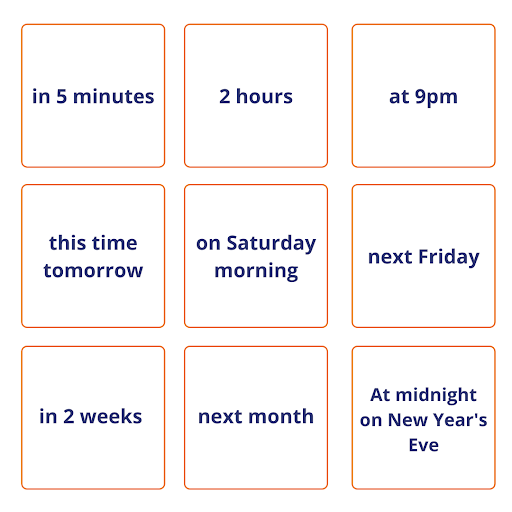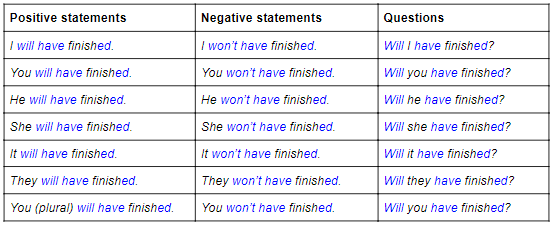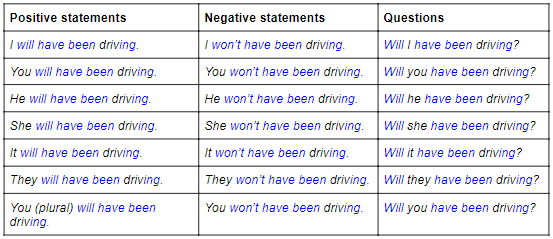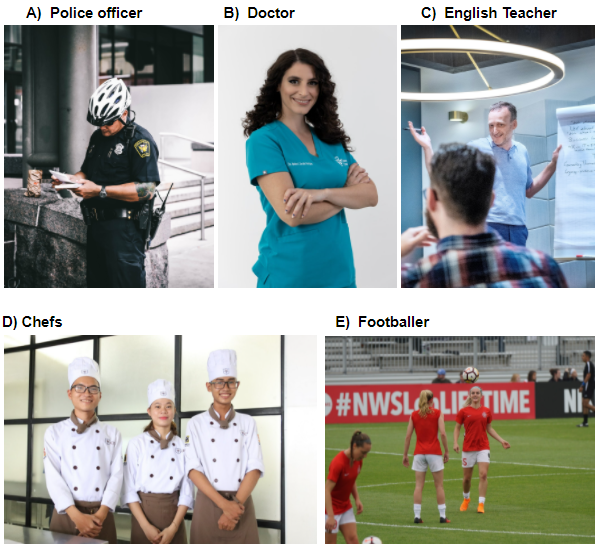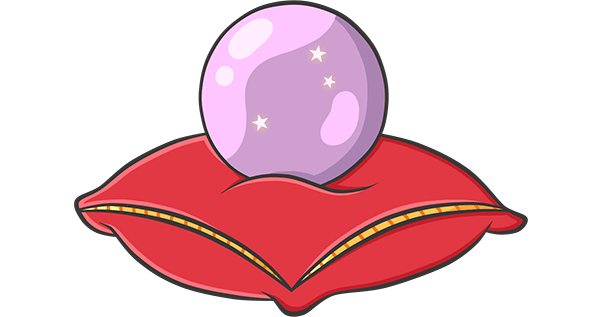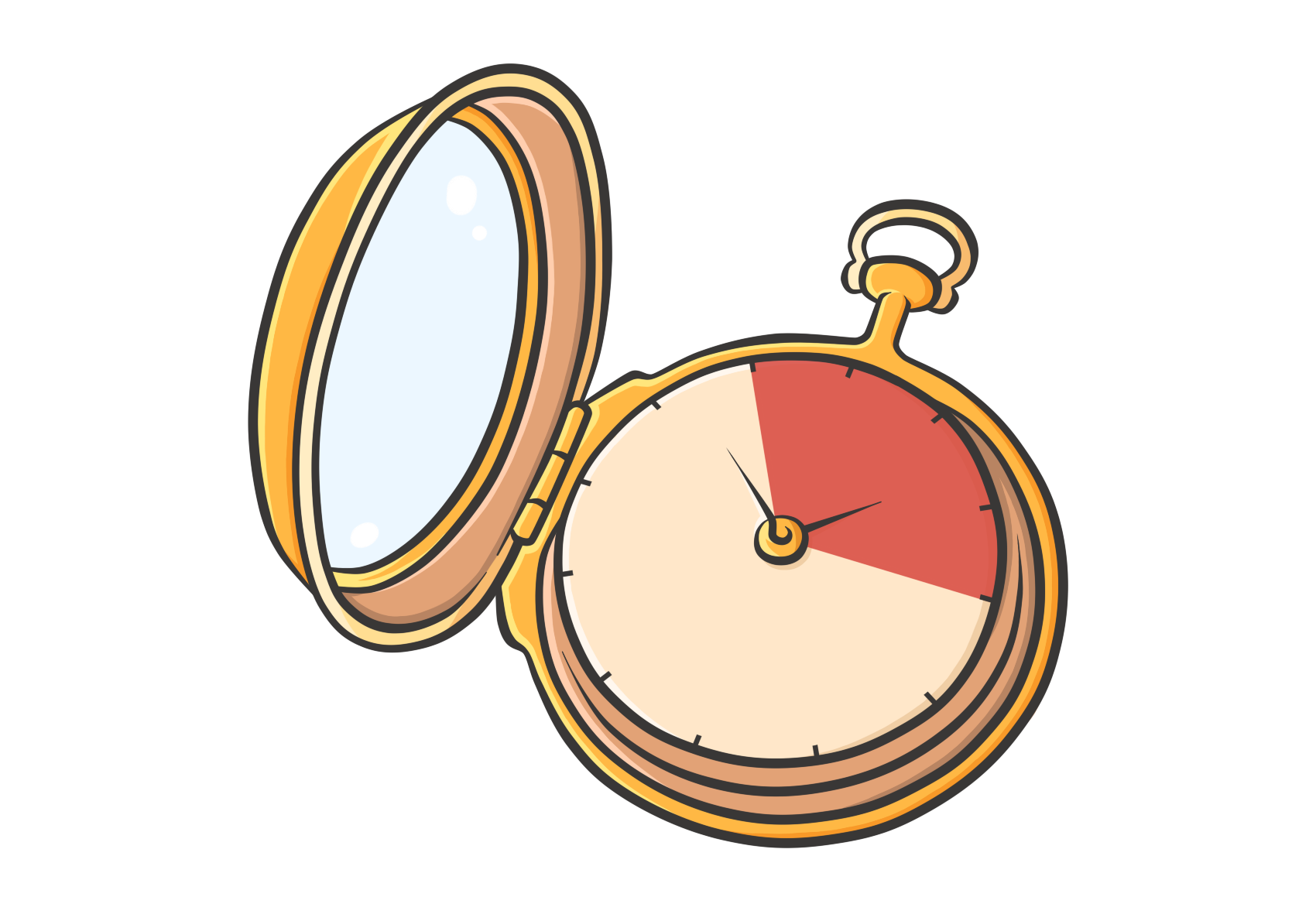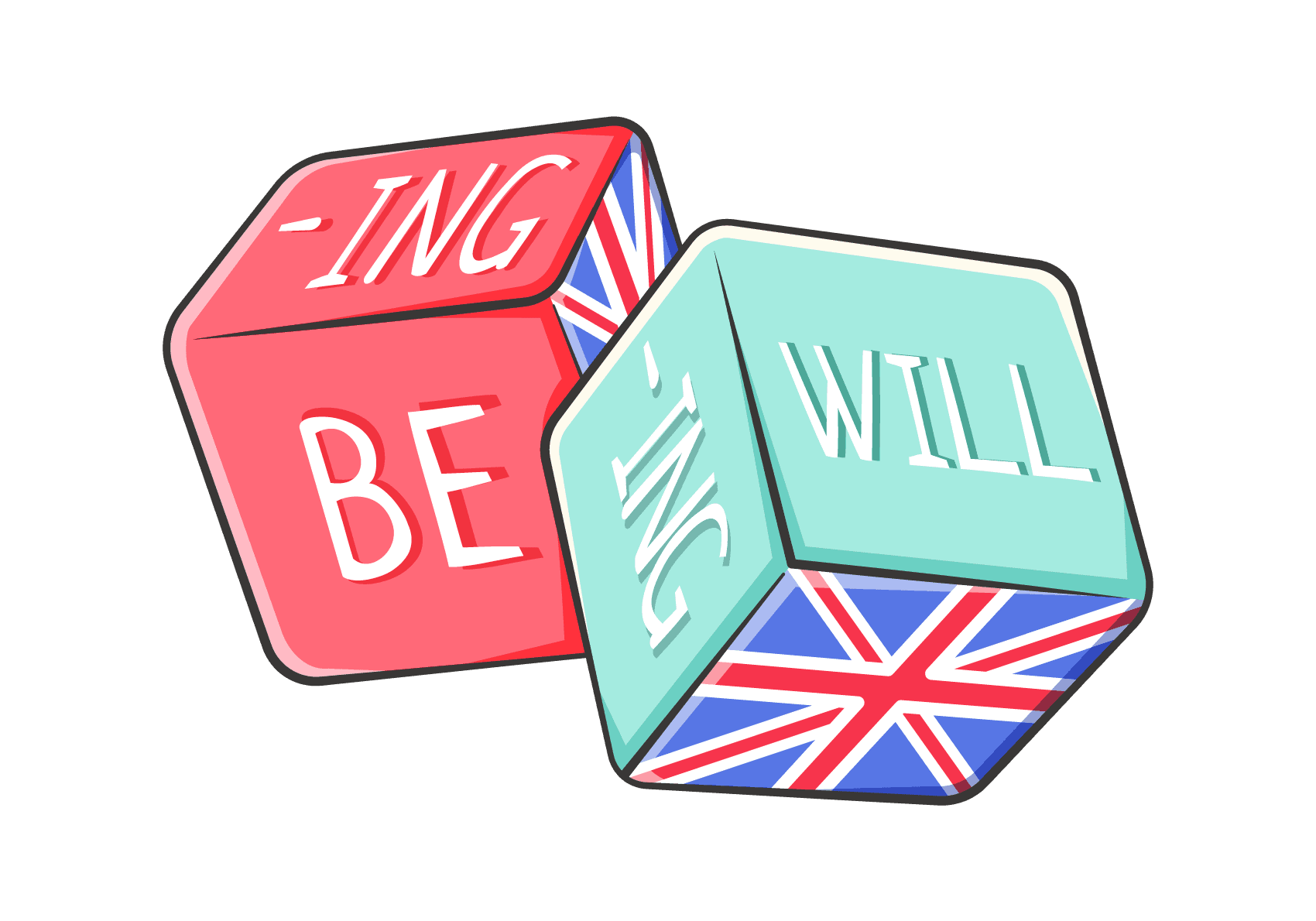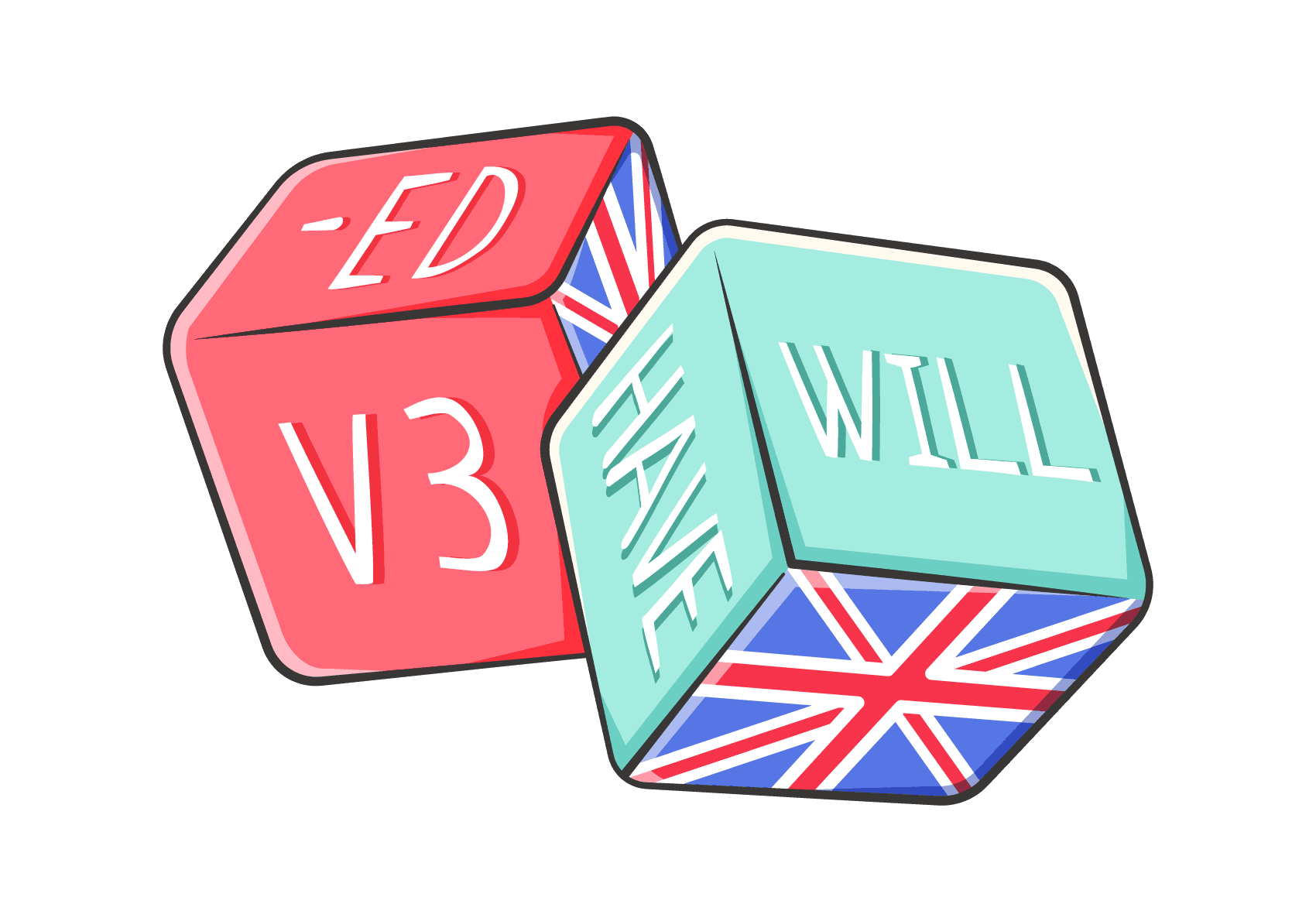“Your future is whatever you make it, so make it a good one.” – Doc Brown, Back to the future.
Just like the past and present tenses, there is more than one future tense in English. These change depending on the function and what we want to say.
Today we’re going to look at four future tenses: the future simple, the future continuous, the future perfect and the future perfect continuous. We’ll show you how and when to use them. We’ll also share with you some fun videos and activities to help you understand them better.
Ready to learn? Let’s go!
The future tenses
Take a look at the four future tenses in English and how they’re used in a sentence:
1. Future Simple
Let’s start with the basics. The future simple is used to talk about a time later than now and can be used in lots of different ways.
Form
- It is made up of the verb will/won’t + base infinitive (infinitive without to).
- Because will is a modal verb it doesn’t change depending on the person doing the action.
- We can use contractions e.g. I will = I’ll.
- In the negative, we can also use will not for more emphasis.
- Won’t is more common in speech.
- In short answers we say: yes X will or no X won’t.
Here’s a look at the future simple in positive and negative statements and questions.
Uses and examples
- Instant or spontaneous decisions – I’m hungry. I think I’ll make a sandwich.
- Future predictions based on a belief – I’m sure you’ll pass the test.
- Promises – I won’t tell anyone your secret.
- Offers – I’ll carry your bags for you.
- Requests – Will you tell Henry I called?
- Threats – If you do that again, I’ll tell Mum.
- Future facts – I’ll be back later tonight.
Shall
We can use shall instead of will for future time references with I and we. However, it is slightly more formal.
E.g. We shall never forget this beautiful day.
It is also common to use shall in questions to make offers, suggestions or ask for advice.
E.g. Shall I carry these bags for you?
Shall I open the window?
What shall I tell Mary about the broken vase?
Be going to vs will
It’s important to note that for predictions based on evidence and for future plans we use be going to not will.
E.g. Look at those grey clouds. It’s definitely going to rain!
– What are you doing after work?
– I’m going to the gym.
Activity One
For more about the differences between will and be going to to talk about the future, watch this video from Learn English with TV Series:
2. Future continuous
Now let’s move on to the future continuous. Generally, we use this tense to talk about things in progress at a particular time in the future. Take a look at the form:
Form
The structure of the future continuous is as follows: will/won’t + be + ing form
Uses and examples
- An action in progress at a specific time in the future (at 5pm, this time tomorrow, in two weeks, in five years time etc.). This time tomorrow, I’ll be flying to Barbados.
- An action we see as new or temporary. I’ll be working for my Dad until I find a new job.
- Predictions or guesses about future events. He’ll be coming to the party, I guess.
- Predictions about the present. She’ll be getting married right now, I imagine.
- Polite enquiries. Will you be joining us for dinner?
Stative verbs
It’s important to remember that some verbs cannot be used in the continuous tense. These are called stative verbs. Stative verbs describe states, feelings, thoughts and opinions. Instead of the future continuous, we use the future simple tense for these verbs. Here are some examples:
Activity two
Here’s a fun activity to practise what you’ve learnt about the future continuous. All you have to do is talk about what you’ll be doing at these different points in time. Try saying them out loud or write down your answers on a piece of paper. We’ll post some possible answers at the end of this blog post.
What will you be doing…?
3. Future perfect
Once you’ve mastered the future continuous, it’s time to learn the future perfect. The future perfect is used to talk about a completed action in the future. Here’s a look at the form:
Form
- The form of the future perfect is will/won’t + have + past participle.
- Regular past participles end in -ed.
- Irregular past participles don’t follow the common conjugation pattern.
Uses and examples
- An action that will be completed before a specific time in the future. Next September, we’ll have been married for 50 years.
- Use by or by the time to mean some time before. I’ll have finished this report by the time you’re home.
- Use in, in a day’s time, in two weeks’ time, in three months’ time etc. to mean at the end of this period. In three years’ time, I’ll have completed my degree.
Activity three
Should you use has instead of have for third person in the future perfect? Here’s BBC Learn English with the answer.
4. Future perfect continuous
We use the future perfect continuous to show that something will continue up until a particular event in the future. We normally use it to emphasise how long something will have been happening for.
Form
The form of the future perfect continuous is will/won’t + have + been + ing (present participle)
Uses and examples
- To show that something will continue up until a particular event in the future. In October, I’ll have been working here for ten years.
- To show something finished just before another time action (cause and effect). When I arrive, I’ll have been working all day, so I’ll be tired.
- With time expressions (by + then / tomorrow / next year etc., by the time, when). By the time we arrive, we’ll have been travelling for fifteen hours.
Activity four
Look at these five photos of people with different professions. Write down sentences using the future perfect continuous to describe what they will have been doing four hours into their work shift. E.g. They will have been cooking for four hours. We’ll write some examples at the end of the blog post.
Suggested Answers
Activity two
- In five minutes I’ll still be reading this blog post.
- In two hours I’ll be at home watching the TV on the sofa.
- At 9pm I’ll be cooking dinner.
- This time tomorrow I’ll be doing my English exam.
- I’ll probably be playing football on Saturday morning.
- I’ll be having dinner with friends next Friday.
- I’ll be having my operation in 2 weeks.
- I’m not sure what I’ll be doing next month.
- I’ll be saying goodbye to 2021 at midnight on New Year’s Eve.
Activity four
- A) Police officer – He’ll have been catching criminals for four hours.
- B) Doctor – She’ll have been saving lives for four hours.
- C) English Teacher – He’ll have been teaching grammar for four hours.
- D) Chefs – They’ll have been cooking for four hours.
- E) Footballer – She’ll have been kicking a ball around for four hours.
So there you have it. You’ve officially learnt the future tenses. Well done you! If you’d like to learn more grammar, check out the following blog posts:
- 4 Present tenses and how to use them
- 4 Past tenses and when to use them
And if you’d like some extra help, why not join one of our General English Courses, to practise using these tenses in conversation?
Glossary for Language Learners
Find the following words in the article and then write down any new ones you didn’t know.
to be made up of sth. (pv): to be comprised up of something.
out loud (exp): audibly.
to master sth. (v): to become an expert at something.
work shift (n): a period of time that you work.
Key
pv = phrasal verb
exp = expression
n = noun
v = verb
Study English at Oxford House Barcelona
Interested in taking an English course at Oxford House Barcelona? Check all the different English classes we can offer you or contact us for more information.
Study English at Oxford House Barcelona
Interested in taking an English course at Oxford House Barcelona? Check all the different English classes we can offer you or contact us for more information.
The future tense is one of the three main verb tenses in the English language, along with the past tense and the present tense. Although some grammarians argue that there are only two real verb tenses in English, the past and the present, it’s now widely accepted that the future tense is a main verb tense; therefore, we’ve written this explanation all about it for you!
Future tense: definition
We use the future tense to talk about an event, action, or state that hasn’t yet happened but is expected to happen in the future.
The future tense isn’t formed with verb inflections (like the past and present tenses), but with the help of auxiliary verbs, such as will and shall and the words ‘going to’. For example, ‘I will see you later’.
Let’s explore the various ways we can talk about the future in more detail, looking at examples along the way.
Examples of the future tense
Here are some examples of the future tense in context:
- I think it will rain.
- Andrea will be able to help you with this.
- Chloe will be working all day tomorrow.
- I‘ll get the phone!
- It’s going to snow tomorrow.
- I shall have gone home by then.
- They will have been dating for 10 years in March.
Each of these examples tells us about an event, action, or state that is expected to happen in the future but hasn’t yet taken place.
Uses of the future tense
We know that the future tense is used to talk about future events, but let’s be more specific about what exactly we can use the future tense to say:
-
Predictions — e.g. ‘I think it’ll snow tomorrow!’
-
Immediate or spontaneous actions/events — e.g. ‘we’ll pay!’ or ‘I’ll get the door’
-
Plans and arrangements — e.g. ‘I’ll meet you outside at 3’
-
Invitations — e.g. ‘Will you marry me?’
-
Expressing (un)willingness — e.g. ‘I’ll give you a lift’ or ‘he won’t leave!’
-
Looking forward to a future event — e.g. ‘This time next year I will have finished school’
Although the word ‘shall‘ is also a modal auxiliary verb that can be used to express the future tense, it is a lot less common. It is mostly used to make suggestions or offers e.g. ‘shall we go to the zoo and see the monkeys?’ or ‘shall I pay?’.

Forming the future tense
Believe it or not, some linguists argue that the English language does not have a future tense. So why on earth are we learning about it?
Well, linguists don’t mean we can’t talk about the future in English, they just mean that English does not have special inflections to form the future tense like we do in the past and present tenses.
When we talk about the past we use the inflection -ed (e.g. ‘danced’) with the verb root, as well as irregular verb forms (e.g. ‘grew’).
When we talk about the present we can use the inflection -ing with the verb root to show a continuous present tense action (e.g. ‘I am walking’).
Instead of using inflections, we can form the future tense using the modal auxiliary verb ‘will‘ along with the verb root, e.g. ‘I will call you tomorrow’.
We can also form the future tense using the word construction ‘going to’, e.g. ‘I’m going to the cinema tonight’ (We will cover this in more detail later).
Types of future tense
Each of the three main tenses (past, present, and future) is divided into four aspects. Aspect shows us the time-related characteristics of a sentence, indicating whether an action/state is ongoing, completed, or repeated.
The four aspects are: simple, continuous (progressive), perfect, and perfect continuous (or perfect progressive).
The ‘continuous’ tense is also known as the ‘progressive’ tense. These terms are interchangeable.
Let’s look at how we can combine the future tense verb ‘will‘ with aspects to talk about the future in different ways.
Future simple tense
The future simple tense is used to refer to an action, event, or state that begins and ends in the future.
It does not state whether this action will be completed or ongoing, but simply states the fact that an action will be or is expected to be carried out.
You can form the future simple tense by using this formula:
Subject + will + verb root (i.e. the infinitive without the word ‘to’)
The future simple tense is mostly used for spontaneous/immediate decisions or predictions. Take a look at these examples:
When I’m rich, I will live in a mansion. (prediction)
I‘ll get the door! (immediate decision)
I‘ll do my homework later. (immediate decision/prediction)
In the future, robots will rule the world. (prediction)
Other ways to form the future simple tense include the following:
| Negative |
| Subject + will not (won’t) + verb root (the infinitive without ‘to’)e.g. They won’t find us here!e.g. She won’t like the zoo. |
| Interrogative |
| Will/shall + subject + verb root (the infinitive without ‘to’) eg. Shall I pick you up later?eg. Will we see the monkeys? |
Future continuous (progressive) tense
The future continuous tense is used to describe an ongoing action or state in the future. It shows that something is expected to continue for a certain period of time and that the action/event is unfinished.
You can form the future continuous tense by using this formula:
Subject + will + be + present participle (root verb + -ing)
Let’s look at some examples:
-
I will be arriving on the train tomorrow.
-
We will all be watching the show on Friday.
-
Amy and David will be competing against each other.
The continuous aspect can only be used with action verbs because it is possible to complete them within a certain amount of time. Stative verbs that express a state of being cannot be used with the continuous aspect. For example, we would not say ‘I will be loving you on Friday‘.
Other ways to form the future progressive tense include the following:
| Negative |
| Subject + will not (won’t) + be + verb root + -inge.g. Ella won’t be sleeping e.g. We won’t be going later |
| Interrogative |
| Will + subject + be + verb root + -ingeg. Will I be picking you up later?eg. Will we be seeing the monkeys? |

Future perfect tense
The future perfect tense is used to talk about an action/event that will be completed between now and a certain time in the future, or before another action/event takes place.
You can form the future perfect tense by using this formula:
Subject + will have + past participle
Let’s look at some examples:
- I will have left by then.
- Vicky will have gone by the time you get back.
- Everyone will have eaten by 8 pm.
Other ways to form the future perfect tense include the following:
| Negative |
| Subject + will not (won’t) + have + past participlee.g. Ella will not have slepte.g. We won’t have eaten all day |
| Interrogative |
| Will + subject + have + past participle eg. Will she have slept?eg. Will we have eaten? |
Future perfect continuous (progressive) tense
The future perfect continuous tense looks forward to an action/event that will happen in the future. Like the future continuous tense, we only use this verb tense with action verbs.
You can form the future continuous perfect tense by using this formula:
Subject + will have + been + present participle (root form + -ing)
Let’s look at some examples:
-
In March, we will have been dating for three years.
-
On Thursday, Ritchie will have been working here for a month.
-
By five o’clock, she will have been waiting for 45 minutes.
In each example, we are projecting ourselves into the future and looking back to an unfinished, continuous action or event.
Other ways to form the future perfect progressive tense include the following:
| Negative |
| Subject + will not (won’t) + have + been + verb root + -inge.g. Ella won’t have been sleeping e.g. We won’t have been working |
| Interrogative |
| Will + subject + have + been + past participleeg. Will she have been running?eg. Will we have been working all day? |
Other ways to talk about the future
Using the modal auxiliary verb ‘will’ isn’t the only way in which we can talk about the future. We can also talk about actions/events that haven’t yet happened using a combination of other tenses and aspects.
As discussed, there are no inflections in the English language that mark verbs as being the future tense. We can therefore refer to the future using other constructions.
Take a look at the following examples:
Using the present continuous (progressive) tense
The present continuous tense is often used to express an event that is already planned for the future.
We can use the following formula:
Subject + [am/are/is] + present participle (root form + -ing) + timestampTake a look at the following examples:
- Paul is moving to New York next year.
- Liam is going snowboarding at the weekend.
- I’m playing football with Becky on Friday.
The sentences are in the present progressive tense however the timestamp (e.g. ‘Friday’) lets us know that the event is planned for the future.
Using the ‘going to’ + infinitive to talk about the future
We can also refer to the future using the construction ‘going to‘ e.g. ‘I’m going to play hockey later’. This is not considered a tense, but rather a construction that we can use to talk about the future.
We use the following formula when using ‘going to’:
Subject + [am / are / is] + going to + base form of the verb
We commonly use the construction ‘going to’ when talking about predictions (i.e. what we think is going to happen) or intentions (i.e. we’ve decided to do something).
Take a look at the following examples:
- You’re going to miss the bus! (prediction)
- Be careful, it’s going to be stormy tomorrow (prediction)
- Abi says she’s going to go on holiday this year (intention)
- I’m going to buy a big house when I have the money (intention)
Using the present simple tense
We can also use the simple present tense to talk about future events that have been scheduled. This is often scheduled meetings, flights, timetables, etc.
Hurry up! The train leaves at 9:30.
The really important meeting begins at 3 pm.
In these sentences, the simple present tense is used to express scheduled events that are happening in the near future.
Future Tense — Key Takeaways
-
The main function of the future tense is to express an action (or state of being) that has not yet happened but is expected to happen in the future.
- We can use the future tense to talk about plans, predictions, make invitations, express willingness, make suggestions, look back at a future event, and much more.
-
The four future verb tenses are: future simple tense, future continuous (progressive) tense, future perfect tense, and future perfect progressive (continuous) tense.
-
We form the future tense using the modal auxiliary verb ‘will’ + the verb root.
-
We can also talk about the future using a combination of other tenses and aspects.
1. What is a Future Tense?
If we want to write and speak about things that we think will or could happen in the future, we have to use the future tense. It shows that the timeline of the action hasn’t actually occurred yet, but will later. We discuss all kinds of things about the future, from wishes to predictions; starting tonight, tomorrow, or even 20 years from now, so there are different types of future tenses to help share them all. But, the future tense is special, because unlike the past and present tenses, it doesn’t have its own verb forms.
2. Examples of Future Tense
The future tense can be expressed in a variety of ways. Here are some of the most common:
- I will write a book. Simple Future
- He will be writing a book. Future Continuous
- They will have written the book. Future Perfect
- We will have been writing the book in class. Future Perfect Continuous
3. Parts of the Future Tense
In the past and present tenses, we conjugate verbs so they it reflect the time—but, the future tense doesn’t have its own verb forms! So, for the future tense, we always need “helping verbs,” called modal auxiliary verbs and auxiliary verbs—these “help” create it.
a. Modal Auxiliary Verbs
Modal auxiliary verbs, or modal auxiliaries, are essential in the future tense. First, they show how likely it is for something to happen. Second (and more importantly), without them, we can’t form the future tense at all! The main modal auxiliaries are:
- can
- could
- may
- might
- must
- shall
- should
- will
- would
To create the future tense, we generally use will or shall. Here are some examples, with the modals in green.
- Jane might be cooking dinner. A chance it will happen
Jane could cook dinner later. Possible that it will happen - Jane must cook dinner tonight. Very likely to happen
Jane will be cooking dinner. Definitely will happen
b. Auxiliary Verbs
Auxiliary verbs, or auxiliaries, are important in all three tenses. Though they have a difficult name, they are easy to use—they’re just versions of the verbs to be, have, and do:
- To be: am, are, is, be, been, being, was, were
- Have: had, has, have, having
- Do: do, did, does
We need auxiliaries to add grammatical meaning to a sentence. Look at these examples:
- Jane will going to bed at 8pm.
- Jane will slept about 8 hours, so she won’t be tired.
These sentences are definitely missing something! They sound pretty strange, so let’s complete them with auxiliaries (purple):
- Jane will be going to bed at 8pm.
- Jane will have slept about 8 hours, so she won’t be tired.
c. Verbs
Usually, the main verb of a sentence needs to be conjugated to match the tense, but in English there is no future verb tense. So, to create it, we always need to use a modal auxiliary, like will, and it often needs an auxiliary, like be. This chart shows how to use verbs, modals and auxiliaries to express the future tense.
| Base Verb | Simple Future | Future Continuous | Future Perfect | Future Perfect Continuous |
| talk | will talk | will be talking | will have talked | will have been talking |
| hear | will hear | will be hearing | will have heard | will have been hearing |
| do | will do | will be doing | will have done | will have been doing |
| run | will run | will be running | will have run | will have been running |
| work | will work | will be working | will have worked | will have been working |
| try | will try | will be trying | will have tried | will have been trying |
You can take a look at how these verbs work in other tenses in our articles on the past tense and the present tense.
4. Types of Future Tenses
There are lots of ways to talk about the future, so we need several types of the future tense. Here we will discuss four important types: the simple future, future continuous, future perfect, and future perfect continuous, and each has their own important purpose.
a. Simple Future
You can use the simple future to talk about something (like an action or event) that will happen any time in the future, and also to talk about something that will happen one time. In the simple future, we use the base form of the verb with a modal auxiliary, like will. So, the simple future follows the form Subject + modal + Base Verb.
- I will eat a cheeseburger for dinner.
- Jane might buy a new car tomorrow.
- You will look great in that dress!
- She should pass the exam, I’m not worried.
b. Future Continuous
The future continuous tense talk about things will be happening continuously in the future. To show this, we use a modal, the verb to be, and a verb ending in ing. Sentences in the future continuous tense follow the Subject + modal + Verb to be + ing Verb model:
- Jane will be driving to work.
- I will be eating a cheeseburgers until the day I die.
- They should be running the race at 6pm.
- The dogs could be barking loudly when you arrive.
c. Future Perfect
The future perfect tense shows that an event will have happened before another thing in the future. It often expresses that by the time one action or event happens, another will have happened. To use the future perfect, we need to place the modal will and the auxiliary have before the past form of the main verb (this shows that we “will have done” an action). Using a past verb in the future tense may seem confusing, but remember, it’s to show that something will have happened before another thing, so we need it!
So, a sentence written in the future perfect should follow the Subject + will + have + Past form of main verb pattern:
- Jane will have traveled the world by the time she turns 30.
- When you get home I will have eaten dinner already, but we can go out for dessert!
- They will have lived in 10 states once they move to New York.
- He will have taken the exam already, so he won’t need to study more.
d. Future Perfect Continuous
The future perfect continuous describes events and/or actions that have been going on continuously until a certain time in the future. Often, it’s used to show cause and effect; in other words, because one thing will have been happening, another will happen. To use it, we need to combine have and been with the continuous form of the verb (ending in ing), this shows that the action or event “will have been” happening.
A sentence in the future perfect continuous follows Subject + modal + have been + ing Verb:
- Jane will have been working for 12 hours, so I don’t think she will want to cook.
- I should have been watering the plants every day; I hope they won’t die.
- They will have been living in that house for 10 years this March.
- He will have been driving since noon, so he will need a rest.
5. How to Write in the Future Tense
Because it doesn’t have its own verb forms, using the future tense can sometimes be more tricky than using the past or present. The most important thing to remember is that the future tense is only used to talk about things that haven’t happened yet—but will in the FUTURE. It can only predict, assume, and suggest that events will occur. So, remember these few important rules:
- The future tense is for things that will happen later
- There are no “future verbs”
- To create the future tense, you always need modals and auxiliaries
Finally, here are some questions that can help you figure out whether or not you should use the future tense for your writing:
- Are you talking about something that hasn’t happened yet?
- Are you trying to show a cause and effect situation that could occur?
- Are you making a prediction, assumption, or suggestion about the future?
- Will something be going on for a while, past this moment?
- Will something happen later because of something else in the past?
If you answered yes, then you are talking about the future, and you should use the future tense! If not, then you can consider whether the past or the present tense may be better for what you are trying to say.
В этой статье мы разберем формы будущего времени и узнаем, в каких случаях лучше употреблять то или иное время и конструкцию.
Содержание:
- 1. Время Future Simple
- 2. Конструкция to be going to do smth
- 3. Разница между Future Simple и to be going to do smth
- 4. Время Present Simple
- 5. Время Present Continuous
- 6. Разница между Present Simple и Present Continuous
- 7. Время Future Continuous
- 8. Время Future Perfect Simple
- 9. Время Future Perfect Continuous
- 10. Разница между Future Perfect Simple и Future Perfect Continuous
- 11. Другие способы выражения будущего времени в английском языке
В английском языке существует несколько способов говорить о будущем. В статье вас ждет информация о разных формах выражения будущего времени, актуальные примеры, а также сравнение всех способов.
Начнем с двух наиболее популярных способов выразить будущее время в английском языке — Future Simple и конструкции to be going to do smth.
Время Future Simple
Future Simple Tense (простое будущее время в английском языке) — это время указывает на действие, которое, вероятно, произойдет в ближайшем или неопределенном будущем.
Образование Future Simple
Давайте посмотрим, как образуется будущее время в английском языке.
Утвердительное предложение в Future Simple
Подлежащее + вспомогательный глагол will + смысловой глагол без частицы to
I will (I’ll) read this novel soon. — Я скоро прочту этот роман.
Perhaps, we will (we’ll) go on a trip to Italy. — Возможно, мы поедем в Италию.
Отрицательное предложение в Future Simple
Подлежащее + вспомогательный глагол will + частица not + смысловой глагол без частицы to
I will not (won’t) play this game. — Я не буду играть в эту игру.
She will not (won’t) pass the exam. — Она не сдаст экзамен.
Вопросительное предложение в Future Simple
Вспомогательный глагол will + подлежащее + смысловой глагол без частицы to
Will they help us choose the furniture? — Они помогут нам выбрать мебель?
Will he make a birthday wish? — Он загадает желание на день рождения?
Также в вопросах может встречаться глагол shall. Он используется, чтобы предложить помощь или что-то сделать вместе. Shall употребляется только с местоимениями I и we.
Shall we proceed? — Давайте продолжим?
Shall I help you with your bags? — Помочь тебе нести сумки?
Shall we eat out tonight? — Поужинаем где-нибудь сегодня вечером?
Употребление Future Simple
Давайте узнаем, когда используется Future Simple.
- Спонтанные решения, принятые в момент речи
Время Future Simple служит для того, чтобы объявить о своем решении в момент его принятия.
— The phone’s ringing.
— Oh, I’ll pick it up.
— Звонит телефон.
— О, я отвечу.— We’ve run out of sugar.
— No problem. I’ll buy some this afternoon.
— У нас закончился сахар.
— Не проблема. Я куплю его сегодня днем.— We need to leave now.
— No, I won’t go anywhere.
— Нам нужно уходить сейчас же.
— Нет, я никуда не пойду. - Обещания
Future Simple используется, когда мы что-то обещаем. Часто в таких предложениях употребляется глагол to promise (обещать).
I promise I will take care of your cat. — Я обещаю, что позабочусь о твоем коте.
I will always love you. — Я всегда буду любить тебя. - Предложения
Future Simple используется для выражения предложения что-то сделать. Напомним, что в данной функции в вопросительных предложениях может встречаться глагол shall.
Do you feel bad? I’ll bring you some medicine. — Ты плохо себя чувствуешь? Я принесу тебе лекарства.
Shall we take a coffee break? — Прервемся на кофе? - Угрозы
Future Simple используется для выражения угрозы.
You will regret your decision. — Ты пожалеешь о своем решении.
Stop there or I will shoot. — Стойте на месте, или я буду стрелять. - Предсказания, основанные на мнении говорящего
Future Simple используется для предсказаний, которые основываются исключительно на опыте и мнении говорящего. Когда мы используем will, говоря о будущем, у нас нет фактов, подтверждающих то, что действие произойдет.
В этой функции часто используются такие маркеры Future Simple, как I think (я думаю), I reckon (я думаю), I guess (я догадываюсь), I believe (я верю/считаю), I suppose (я предполагаю), I assume (я предполагаю), I’m sure (я уверен), I hope (я надеюсь), I’m afraid (я боюсь) и другие, а также слова perhaps/maybe (возможно), probably (вероятно), certainly (конечно).
I reckon he will make a good father. — Я думаю, он будет хорошим отцом.
I will not succeed in this business. — Я не преуспею в этом деле. - Будущие события, которые нельзя изменить
Future Simple используется в ситуациях, когда действие, о котором идет речь, точно произойдет, и мы ничего не можем изменить. То есть в этих ситуациях от нас ничего не зависит.
He’ll turn 60 in May. — В мае ему исполнится 60.
Хотите попрактиковаться в выборе верной формы выражения будущего времени? Записывайтесь на курс практической грамматики.
Конструкция to be going to do smth
Конструкция to be going to do smth в английском языке используется, чтобы сообщить о своих планах или намерениях что-то сделать в будущем. В разговорной речи очень популярна сокращенная форма оборота to be going to do smth — to be gonna do smth.
Формы конструкции to be going to do smth
Давайте посмотрим на использование конструкции to be going to do smth в утвердительных, отрицательных и вопросительных предложениях.
Утвердительное предложение с конструкцией to be going to
Подлежащее + вспомогательный глагол am/is/are + going to + основная форма глагола без частицы to
I’m going to take an IELTS exam. — Я собираюсь сдавать IELTS.
We are going to throw a party. — Мы собираемся устроить вечеринку.
He is going to ask her on a date. — Он собирается пригласить ее на свидание.
Отрицательное предложение с конструкцией to be going to
Подлежащее + вспомогательный глагол am/is/are + частица not + going to + основная форма глагола без частицы to
I am not going to tell her about my plans. — Я не собираюсь рассказывать ей о своих планах.
They are not going to invite any of my friends. — Они не собираются приглашать никого из моих друзей.
She isn’t going to go abroad. — Она не собирается уезжать за границу.
Вопросительное предложение с конструкцией to be going to
Вспомогательный глагол am/is/are + подлежащее + going to + основная форма глагола без частицы to
Are you going to have lunch with me? — Ты собираешься пообедать со мной?
Is she going to get married? — Она собирается выйти замуж?
Are they going to ask him for help? — Они собираются попросить у него помощи?
Функции to be going to do smth
- Планы и намерения
Употребление конструкции to be going to do smth выражает наши намерения или планы.
He’s studying medicine. He’s going to become a doctor. — Он изучает медицину. Он собирается стать врачом.
She’s not going to enter the university. — Она не собирается поступать в университет. - Предсказания будущего, основанные на очевидных фактах
Мы используем оборот to be going to do smth, чтобы указать на событие, которое вот-вот произойдет или уже начинает происходить. В данном случае говорящий обычно видит какое-то доказательство этому, поэтому сказанное им не является его личным мнением.
Wow! Look at the trees! They’re going to blossom. — Ух ты! Посмотри на деревья! Они скоро зацветут.
The sun’s shining brightly. So, it’s going to be a beautiful day. — Солнце светит ярко. День будет чудесным.
Разговорная форма конструкции to be going to do smth — to be gonna do smth
В фильмах, сериалах и неформальной переписке вместо конструкции to be going to do smth употребляется ее разговорный эквивалент to be gonna do smth. Основной глагол после gonna используется без частицы to (I’m gonna do it). Вопросительные и отрицательные предложения строятся так же, как и с to be going to do smth.
I’m going to lay the table. = I’m gonna lay the table. — Я собираюсь накрыть на стол.
She’s not going to record the album. = She’s not gonna record the album. — Она не собирается записывать альбом.
Is he going to help me? = Is he gonna help me? — Он собирается мне помогать?
Разница между Future Simple и to be going to do smth
Давайте посмотрим, чем отличаются время Future Simple и конструкция to be going to do smth.
| Future Simple | To be going to do smth |
|---|---|
| Спонтанное решение
— Oh, there isn’t any milk. |
Запланированное решение
I’m going to buy her a birthday present. — Я собираюсь купить ей подарок на день рождения. |
| Предсказание, основанное на мнении говорящего
I guess, he’ll pass the test. — Я думаю, он сдаст тест. |
Предсказание, основанное на очевидных фактах
Oh, now. That girl is going to fall off her bike now. — О, нет. Вон та девочка сейчас упадет с велосипеда. |
Время Present Simple
Present Simple — простое настоящее время, которое также используют для выражения будущего. Перед тем как перейти к случаям его использования, давайте вспомним схему его образования.
Образование Present Simple
Утвердительное предложение в Present Simple
I/You/We/They + смысловой глагол
He/She/It + смысловой глагол с окончанием -s
Please, hurry up! The train leaves in 5 minutes! — Пожалуйста, поторопись! Поезд уезжает через 5 минут.
The restaurant closes at midnight. — Ресторан закрывается в полночь.
Отрицательное предложение в Present Simple
I/You/We/They + вспомогательный глагол do + частица not + смысловой глагол
He/She/It + вспомогательный глагол does + частица not + смысловой глагол
The bus doesn’t stop in Venice. We go directly to Rome. — Автобус не останавливается в Венеции. Мы едем прямо в Рим.
She doesn’t celebrate her birthday tomorrow. — Она завтра не празднует свой день рождения
Вопросительное предложение в Present Simple
Вспомогательный глагол do + I/you/we/they + смысловой глагол
Вспомогательный глагол does + he/she/it + смысловой глагол
Does the concert start at 9 p.m.? We are so late! — Концерт начинается в 9 вечера? Мы очень опаздываем!
What time do you finish work tomorrow? — Во сколько ты заканчиваешь завтра работать?
Употребление Present Simple в будущем
- Present Simple используется для выражения будущего, когда говорим о расписании (транспорта, кино).
The final episode of The Big Bang Theory is on Wednesday. — Финальная серия «Теории Большого взрыва» будет в среду.
I’ve just checked the bus timetable in my app. The last bus leaves at 11 p.m. — Я только что проверила расписание автобусов в приложении. Последний автобус отправится в 11 часов вечера. - Present Simple можно употреблять, когда речь идет о событиях и планах, если они зафиксированы и мы не можем их изменить.
What time does our meeting start? — В котором часу начнется наше собрание?
I have a doctor appointment on Monday. — У меня прием у врача в понедельник. - Используйте Present Simple после слов after (после), before (до), as soon as (как только), when (когда), once (когда, как только) и until (до тех пор, пока).
As soon as she arrives, please, ask her to come in. — Как только она приедет, пожалуйста, попроси ее зайти.
Have your lunch before you leave. — Пообедай, перед тем как уйдешь.
Время Present Continuous
С помощью времени Present Continuous также можно выразить планы и намерения. Давайте посмотрим, как образуется время Present Continuous.
Образование Present Continuous
Утвердительное предложение в Present Continuous
Подлежащее + вспомогательный глагол am/is/are + смысловой глагол с окончанием -ing
He is running his first ultramarathon tomorrow. — Он бежит свой первый ультрамарафон завтра.
We are celebrating Katy’s 21st birthday next weekend. — Мы празднуем 21-й день рождения Кэйти на следующих выходных.
Отрицательное предложение в Present Continuous
Подлежащее + вспомогательный глагол am/is/are + частица not + смысловой глагол с окончанием -ing
I am not working tomorrow. It’s my first day off this month! — Я завтра не работаю. Это мой первый выходной в этом месяце!
Their trip got cancelled, so I am not taking them to the station. — Их поездка отменилась, поэтому я не отвожу их завтра на вокзал.
Вопросительное предложение в Present Continuous
Вспомогательный глагол am/is/are + подлежащее + смысловой глагол с окончанием -ing
What time are you leaving? — Во сколько ты уходишь?
Are you working late again next week? — Ты опять работаешь допоздна на следующей неделе?
Употребление Present Continuous в будущем
- Время Present Continuous используется для обозначения запланированного действия, которое произойдет в ближайшем будущем. В таких предложениях, как правило, присутствуют слова today (сегодня), tonight (сегодня вечером), tomorrow (завтра), next week (на следующей неделе), in May (в мае) и т. д.
We are meeting for dinner on Saturday night. You can come if you want. — Мы встречаемся на ужин в субботу вечером. Можешь прийти, если хочешь.
Ted has come back from his business trip so I am not babysitting his son tomorrow. — Тед вернулся из командировки, поэтому я завтра не нянчусь с его сыном. - Время Present Continuous употребляется, когда говорим о действии, которое собираемся совершить сразу же после того, как упомянули о нем. В таких предложениях используем глаголы движения: go (идти), come (приходить), arrive ( приезжать), leave (уходить) и др.
I need to get dressed. Give me a moment and I am coming. — Мне нужно одеться. Дай мне минутку, и я иду.
Sorry, I can’t wait anymore. I’m leaving. — Извини, я не могу больше ждать. Я ухожу.
Разница между Present Simple и Present Continuous
Давайте посмотрим, чем отличаются времена Present Simple и Present Continuous, когда речь идет о будущем.
| Present Simple | Present Continuous |
|---|---|
| Расписание, программа
— What time does the ferry arrive at the harbor? |
Запланированное действие
— What time are you arriving tomorrow? |
Время Future Continuous
Образование Future Continuous
Утвердительное предложение в Future Continuous
Подлежащее + вспомогательные глаголы will be + смысловой глагол с окончанием -ing
I will be driving all day tomorrow to get there in time. — Я буду ехать весь день завтра, чтобы прибыть туда вовремя.
They will be living in a new house when you come back from New Zealand. — Они будут жить в новом доме, когда ты вернешься из Новой Зеландии.
Отрицательное предложение в Future Continuous
Подлежащее + вспомогательные глаголы will be + частица not + смысловой глагол с окончанием -ing
She will not be working on Monday. — Она не будет работать в понедельник.
You can call me, I will not be sleeping. — Можешь мне позвонить, я не буду спать.
Вопросительное предложение в Future Continuous
Вспомогательный глагол will + подлежащее + вспомогательный глагол be + смысловой глагол с окончанием -ing
What will you be doing when I leave? — Что ты будешь делать, когда я уйду?
Will they be watching series all evening again? — Они опять будут смотреть сериал весь вечер?
Употребление Future Continuous
Теперь давайте разберем, в каких случаях это время необходимо.
- Используем Future Continuous, когда говорим о продолжительном действии, которое будет происходить в будущем в какой-то период времени. Это время может быть указано или понятно из контекста.
I will be meditating, so don’t disturb me, please. — Я буду медитировать, поэтому не беспокой меня, пожалуйста.
Sir, you will be giving your speech at the end of the ceremony. Please, be ready. — Сэр, вы будете произносить речь в конце церемонии. Пожалуйста, будьте готовы. - Future Continuous употребляется в вежливых вопросах.
Could you tell me if we will be visiting Saint Paul’s Cathedral today? — Не могли бы вы сказать, будем ли мы посещать Собор Святого Павла сегодня?
Excuse me, what time will you be giving the interview? — Извините, в котором часу вы будете давать интервью?
Время Future Perfect Simple
Образование Future Perfect Simple
Утвердительное предложение в Future Perfect Simple
Подлежащее + вспомогательные глаголы will have + смысловой глагол в 3-й форме
I will have cleaned my room by the time mum gets home. — Я уберу комнату до того, как мама вернется домой.
They will have received the invitation by the end of the week. — Они получат приглашение до конца недели.
Отрицательное предложение в Future Perfect Simple
Подлежащее + вспомогательный глагол will + частица not + вспомогательный глагол have + смысловой глагол в 3-й форме
I will not have finished reading this book by evening. Give me more time! — Я не закончу читать эту книгу до вечера. Дай мне больше времени!
Susan will not have found a new job by that time. — Сьюзан не найдет работу к тому времени.
Вопросительное предложение в Future Perfect Simple
Вспомогательный глагол will + подлежащее + вспомогательный глагол have + смысловой глагол в 3-й форме
Will you have introduced us to your fiance before your wedding? — Ты познакомишь нас со своим женихом до свадьбы?
Will we have finished our course by the end of the year? — Мы закончим наш курс до конца года?
Употребление Future Perfect Simple
Используем Future Perfect Simple для действий, которые будут завершены до определенного момента в будущем. Наиболее популярное слово-маркер этого времени — by (к какому-то моменту).
I will have got my driver’s license by June. — Я получу свое водительское удостоверение к июню.
They will have left by the time we arrive. — Они уйдут к тому времени, как мы приедем.
Mother will have finished cooking by the time you come from school. — Мама закончит готовить к тому времени, как ты придешь со школы.
Время Future Perfect Continuous
Образование Future Perfect Continuous
Утвердительное предложение в Future Perfect Continuous
Подлежащее + вспомогательные глаголы will have been + смысловой глагол с окончанием -ing
By the evening it will have been snowing for 18 hours. — К вечеру снег будет идти уже 18 часов.
By the end of the year I will have been working here for two years. — К концу года я проработаю здесь два года.
Отрицательное предложение в Future Perfect Continuous
Подлежащее + вспомогательный глагол will + частица not + вспомогательные глаголы have been + смысловой глагол с окончанием -ing
She will not have been working long enough by April to participate in a conference. — До апреля она не проработает достаточно, чтобы участвовать в конференции.
We will not have been talking for a month by next Friday. — К следующей пятнице мы не будем разговаривать уже месяц.
Вопросительное предложение в Future Perfect Continuous
Вспомогательный глагол will + подлежащее + вспомогательные глаголы have been + смысловой глагол с окончанием -ing
Will you have been studying German for three years next month? — В следующем месяце ты будешь изучать немецкий уже три года?
Will they have been living here for 20 years by 2025? — Они проживут здесь 20 лет к 2025 году?
Употребление Future Perfect Continuous
- Используем Future Perfect Continuous, когда говорим о действии, которое будет продолжаться до определенного момента в будущем или другого действия.
I will have been teaching her Spanish for a year by the time she visits Spain. — Я буду обучать ее испанскому год к тому времени, как она поедет в Испанию.
How long will you have been waiting for her when she finally arrives in the evening? — Как долго ты будешь ее ждать, когда она наконец-то придет вечером? - Используем Future Perfect Continuous, когда необходимо указать причину какого-либо действия в будущем. В таких предложениях присутствует союз so (поэтому) или because (потому что).
She will feel much better after she visits the psychologist because they will have been discussing all her worries and problems. — Она будет чувствовать себя намного лучше после того, как посетит психолога, потому что они будут обсуждать все ее переживания и проблемы.
They will have been working in the garden since early morning, so they will be exhausted. — Они будут работать в саду с раннего утра, поэтому будут очень уставшими.
She will have been singing for an hour so she will need a few bottles of warm water. — Она будет петь в течении часа, поэтому ей понадобятся несколько бутылок теплой воды.
Разница между Future Perfect Simple и Future Perfect Continuous
Давайте посмотрим, чем отличаются времена Future Perfect Simple и Future Perfect Continuous.
| Future Perfect Simple | Future Perfect Continuous |
|---|---|
| Акцент делается на результате действия и его завершенности
By 3 o’clock he will have finished working on his graduation speech. — К 3-м часам он закончит работать над его речью на выпускной. |
Акцент делается на продолжительности действия
By 3 o’clock he will have been working on his graduation speech for five hours. — К 3-м часам он будет работать над его речью для выпускного уже пять часов. |
Другие способы выражения будущего времени в английском языке
- Когда вы знаете, что что-то должно произойти в будущем, можно использовать конструкцию to be to do something. Она употребляется в формальных ситуациях и приказах, новостных репортажах.
The Prime Minister is to come to open a new hospital tomorrow. — Премьер-министр приедет завтра, чтобы открыть новую больницу.
The court is to pronounce a sentence next week. — Суд вынесет приговор на следующей неделе.
You are to patrol the district tonight. — Ты будешь патрулировать район сегодня вечером. - Конструкцию to be about to do something используем для описания действия, которое вот-вот произойдет.
Please, stop talking. The film is about to start. — Пожалуйста, перестаньте разговаривать. Фильм вот-вот начнется.
Do something! Don’t you see we are about to lose the game! — Сделай что-нибудь! Разве ты не видишь, что мы вот-вот проиграем игру! - Когда вы ожидаете, что что-то должно произойти в будущем, используйте фразу to be due to do something.
They are due to pay back the loan next month. — Они должны погасить кредит в следующем месяце.
She is due to come back tomorrow morning. — Она должна вернутся завтра утром.С этой конструкцией часто используются следующие временные маркеры: tomorrow (завтра), next month (в следующем месяце), at 12 o’clock (в 12 часов).
Надеемся, статья о способах выражения будущего времени в английском языке была для вас полезной и интересной. Чтобы закрепить материал, смотрите вебинары Юлии Гавриленко — методиста нашей школы: «Будущее время в английском языке: начальный уровень» и «Будущее время в английском языке: средний уровень».
Тест по теме «Способы выражения будущего времени в английском языке»
© 2023 englex.ru, копирование материалов возможно только при указании прямой активной ссылки на первоисточник.


